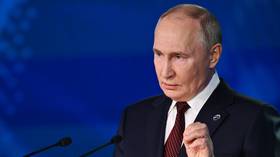‘It takes 2 to tango’: Germany threatens Turkey with major policy overhaul
Berlin said it is losing its temper with Ankara, urging Turkey to release Germans detained on terrorism charges and “return to European values,” or face shrinking investment, restrictions on tourism and curbs to EU financial aid.
Speaking in Berlin on Thursday, Foreign Minister Sigmar Gabriel promised a major overhaul of Germany’s policy toward Turkey, threatening to further strain the already-tense ties between the two NATO members.
“We cannot continue on as before,” Gabriel said, according to a Foreign Office press release. “We have to be clearer than before, so the authorities in Ankara understand that their policies are not without consequences.”
“It takes two to tango!” he said. "I cannot see that the Turkish government is ready at the moment to go this way with us. It's pitiful!"
The latest flare-up was triggered by the arrest of Peter Steudtner, a German human rights activist who was charged by Turkish authorities with supporting a terrorist organization. Demanding his immediate release, Gabriel said Steudtner had been invited to speak at a local human rights workshop and had no contacts among the Turkish opposition or civil society.
Mentioning other Germans, including Die Welt reporter Deniz Yucel, who were charged with alleged links to terrorist groups, the foreign minister announced stricter travel warnings for tourists planning to visit Turkey.
The cases of Steudtner and Yucel were a clear enough example “that German citizens are no longer safe from arbitrary arrests in Turkey,” Gabriel said. “We have no other choice – as we are responsible for the safety of our country’s citizens – but to adapt our travel and safety advice to Turkey and let Germans know what can happen to them when they travel [there].”
Earlier in the day, the German Foreign Office website updated its travel section. The revised travel advice stopped just short of a formal warning, but stated that “people traveling on private or business purposes to Turkey are advised to exercise elevated caution” and to register with the German embassy or consulate even in cases of a short stay.
“On and on, we showed patience and restrained ourselves,” Gabriel went on, adding that “the next stage of escalation has been reached.” Accusing Turkey of “departing the basis of European values,” the top diplomat also vowed economic retaliation.
“I therefore cannot see how we, as the government, can still guarantee corporate investments in Turkey when we are seeing arbitrary, politically-motivated confiscations [of property] there and arbitrary deportations for political reasons,” he underlined.
Berlin will also contact its European partners to discuss possible curbs on EU financial aid to Turkey “in the coming days and weeks,” Gabriel announced.
Germany was Turkey’s top export destination in 2016, according to Reuters, citing IMF data, and was also the second biggest source of Turkish imports, at $21.5 billion. The Association of German Chambers of Commerce (DIHK) has already commented on Gabriel’s speech, saying current developments in Turkey are likely to affect doing business in the country.
"In this environment it is hard to think about German companies making new investments in Turkey,” Volker Treier, DIHK foreign trade chief, told Reuters. Germany bought $14 billion worth of Turkish exports in 2016, according to IMF direction of trade statistics.
In order to prevent retaliatory measures, Ankara has to engage in a “decent dialogue” and provide consular access and “speedy, fair trials” for Steudtner, Yucel and other Germans facing political charges. “We expect [Turkey] to return to European values, respect freedom of expression, freedom of press and freedom of art,” Gabriel reiterated.
Turkey accuses Germany of ‘great political irresponsibility’
Turkey has responded that it is impossible for the government to bow to German demands. “It is not possible for us to accept statements aiming to blur the economic environment based on political motivation, we hope they turn back from this," Ibrahim Kalin, Turkish President Recep Tayyip Erdogan's spokesman, told reporters.
He also said it was “great political irresponsibility” to warn German citizens against traveling to Turkey. In turn, Mehmet Simsek, Turkey’s deputy prime minister, said in a tweet that the country welcomes German investors. The minister also dismissed media reports alleging some major German companies, including Daimler AG and BASF, were investigated by Turkey over “supporting terrorism.”
Press reports that Turkey is investigating Daimler AG and BASF SE are completely false. We welcome German investors. https://t.co/Wt1Ya6fEbG
— Mehmet Simsek (@memetsimsek) July 20, 2017
Over the past year, German-Turkish ties have deteriorated rapidly. After the foiled 2016 military coup, Ankara accused Berlin of harboring followers of Fethullah Gulen, a self-exiled Muslim cleric said to have orchestrated the uprising. Turkish pro-coup officers being granted asylum in Germany have also added more strains to the two countries’ relations.
Turkey repeatedly blocked access for German MPs to NATO’s air base at Incirlik, once home to some 300 Bundeswehr soldiers and several reconnaissance jets. In June, Berlin authorized troop withdrawal, relocating its contingent to Jordan.
Germany, for its part, sparked anger in Turkey’s government by barring top officials from speaking at political rallies on German soil.













